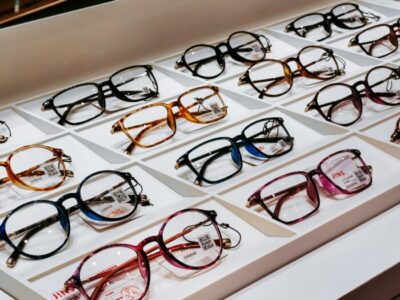Demo eyeglass lenses, the non-prescription plastic lenses used in frames until replaced by prescription lenses, are an example of pre-consumer waste. They are single-use plastics used in the distribution channel before customers purchase the product.
As of 2019, according to MAFO – a journal covering the optical business – 400 million ophthalmic frames are produced annually, and 4000 tons of demo lenses are wasted yearly.
Without a well-established recycling or waste management system, 60% of plastic demo lenses will go to landfills, 25% to incineration, 13% to recycling, and 2% to litter.
Several optical companies – either luxury brands or B-corps – are addressing the problem:
- Costa is a purpose-driven brand that makes prescription lenses and sunglasses for people who live, work, and play on open water. Costa’s Kick Plastic Lens Recycling Program, announced at the Vision Expo East 2019, has made a significant impact. By 2020, more than 750 optical retailers sent their demo lenses to Piedmont Plastics, resulting in more than 4 tons of plastic lenses being recycled into materials appropriate for safety glasses, motorcycle helmets, and scuba masks.
- Eyewear brand Warby Parker (B-corp since 2011) began a program in 2021 to send lenses from its Optical Labs to Eastman. Eastman uses chemical recycling to break the lenses down to their molecular level and reuse them as input for its Acetate Renew, which Eastman exclusively supplies. This acetate is 60% bio-based and 40% certified recycled content.
- Mazzucchelli 1849 and MYKITA, both premium eyewear companies, are already using Acetate Renew for their eyewear.
- Ace & Tate Eyewear (B-corp since 2021) has taken an innovative approach. They partnered with Amsterdam-based Reflow to turn demo lenses into a material for 3-D printing and injection molding. The result is a sleek, protective glass case made entirely from recycled demo lenses, with a soft inlay of 50% certified recycled wool felt, 30% wool, and 20% polyester.








